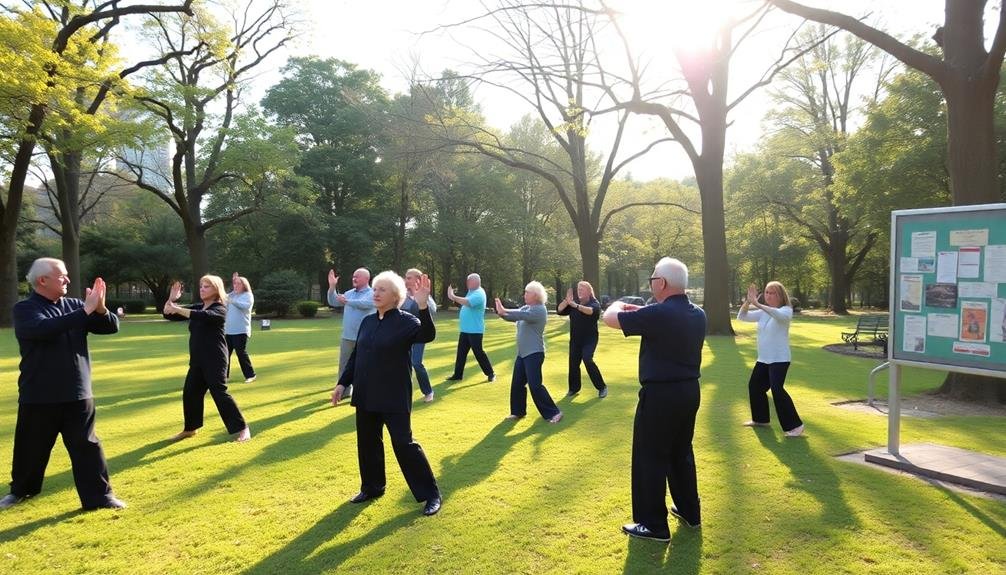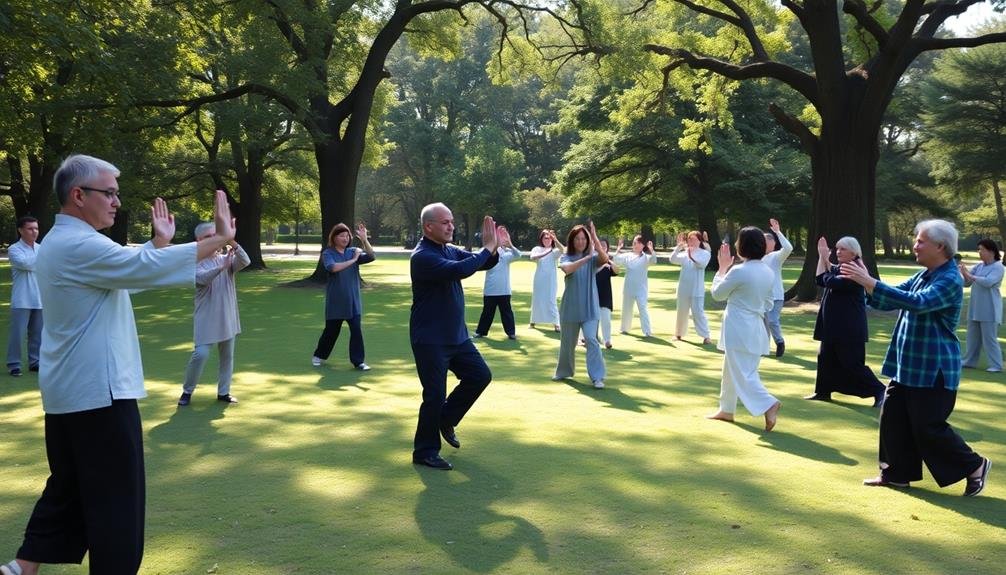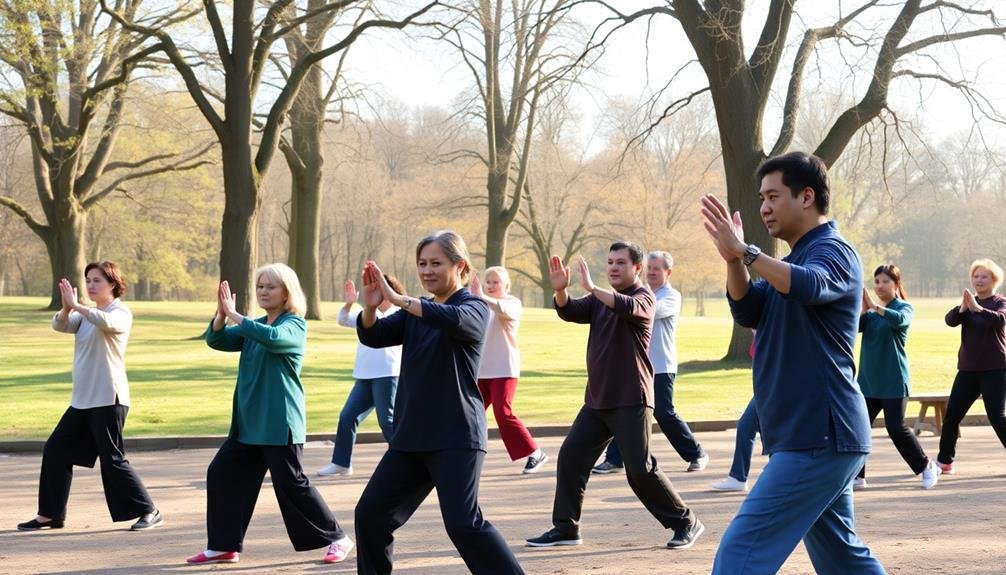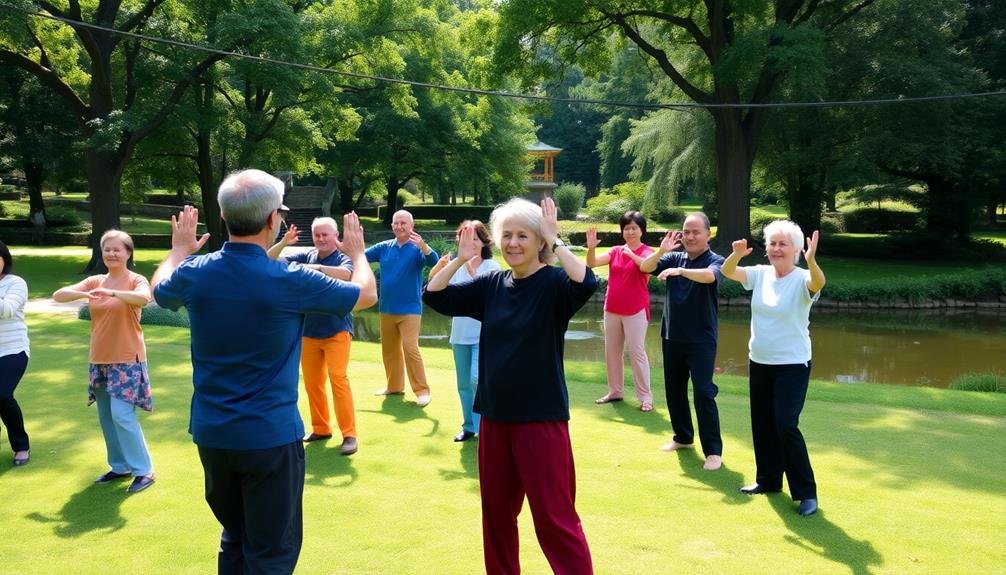To join Tai Chi groups for anxiety relief, start by exploring local resources like community centers and parks. Research class formats and group sizes to find the best fit for your needs. Prepare for your first session by wearing comfortable clothes and arriving early. Communicate openly with instructors about your anxiety concerns. Set realistic expectations, understanding that significant relief may take time. Practice Tai Chi at home to reinforce techniques learned in class. Finally, connect with fellow participants to share experiences and coping strategies. By following these tips, you'll be well on your way to harnessing the anxiety-reducing benefits of Tai Chi in a supportive group setting.
Find Local Tai Chi Groups

To find local Tai Chi groups that focus on anxiety relief, start by exploring community resources. Check your local community center, YMCA, or parks and recreation department for classes or groups. Many of these organizations offer Tai Chi programs specifically designed for stress reduction and anxiety management.
Don't overlook health and wellness centers in your area. Hospitals, mental health clinics, and holistic health practices often host Tai Chi sessions tailored to address anxiety. You'll also find specialized groups at senior centers, which are open to adults of all ages.
Search online platforms like Meetup or Facebook for Tai Chi groups in your vicinity. These platforms often list informal gatherings or practice sessions that welcome newcomers. Local martial arts studios and Asian cultural centers may offer Tai Chi classes with an emphasis on mindfulness and anxiety reduction.
If you can't find a group specifically focused on anxiety, don't hesitate to join a general Tai Chi class. The slow, deliberate movements and focus on breathing can naturally help alleviate anxiety symptoms.
Remember to ask instructors about their experience with anxiety management to guarantee you're getting the support you need.
Research Group Session Formats
When researching Tai Chi groups for anxiety, you'll want to contemplate the session format that best suits your needs.
Look into whether classes are structured with set routines or offer more freestyle practice, as this can impact your learning experience and comfort level.
Also, pay attention to group sizes, as smaller classes may provide more individualized attention, while larger groups can offer a sense of community and shared energy.
Structured vs. Freestyle Classes
Research groups investigating Tai Chi's effects on anxiety often grapple with the choice between structured and freestyle class formats.
As you consider joining a Tai Chi group for anxiety relief, it's important to understand the differences between these approaches.
Structured classes follow a predetermined sequence of movements and exercises, offering consistency and a clear progression path. You'll likely find these classes more suitable if you prefer a systematic approach to learning Tai Chi.
On the other hand, freestyle classes allow for more spontaneity and creativity in movement, which can be beneficial for those who enjoy a more fluid practice.
When choosing between structured and freestyle classes, consider these factors:
- Your learning style: Do you thrive on routine or prefer flexibility?
- Your anxiety triggers: Does structure calm you, or do you find it restrictive?
- Your physical condition: Are you comfortable with improvised movements, or do you need guidance?
- Your goals: Are you aiming for mastery of specific forms or seeking overall stress relief?
Ultimately, both formats can be effective in managing anxiety.
You might even benefit from trying both to determine which suits you best.
Group Size Considerations
Group size plays an essential role in Tai Chi research sessions for anxiety management. When choosing a group to join, consider the number of participants carefully. Smaller groups of 5-10 people often provide more personalized attention from the instructor, allowing you to receive specific feedback on your form and technique. You'll also have more opportunities to ask questions and interact with fellow participants.
Larger groups of 15-30 people can offer a sense of community and shared experience, which may be beneficial for those seeking social support in managing anxiety. However, you might receive less individual attention in these settings. Some research studies use very large groups of 50+ participants to gather more data, but these may not be ideal for personal growth.
| Group Size | Pros | Cons |
|---|---|---|
| Small (5-10) | Personalized attention, Detailed feedback | Limited social interaction |
| Medium (15-30) | Balance of attention and community | Moderate individual feedback |
| Large (50+) | Strong sense of community, More data for research | Minimal individual attention |
Consider your personal goals and comfort level when selecting a Tai Chi group size for anxiety management. You'll want to find the right balance between individual attention and social support to maximize your benefits from the practice.
Prepare for Your First Class

Preparing for your first Tai Chi class doesn't have to be intimidating. With a few simple steps, you'll feel confident and ready to start your journey.
First, wear comfortable, loose-fitting clothes that allow for easy movement. Opt for breathable fabrics like cotton or moisture-wicking materials. Choose flat, flexible shoes or go barefoot if the instructor permits.
Arrive at least 10 minutes early to familiarize yourself with the space and introduce yourself to the instructor. They'll guide you through the basics and help you feel at ease.
Don't worry about memorizing all the movements right away; Tai Chi is a practice that develops over time.
To make the most of your first class:
- Stay hydrated by bringing a water bottle
- Keep an open mind and focus on your breath
- Listen carefully to the instructor's cues
- Don't compare yourself to others; everyone learns at their own pace
Communicate With Group Leaders
Once you've attended your first class, it's important to establish open communication with your Tai Chi group leaders. They're there to guide you and guarantee you get the most out of your practice.
Don't hesitate to ask questions about the movements, breathing techniques, or philosophical aspects of Tai Chi. If you're struggling with a particular form or concept, let them know. They can offer personalized advice or modifications to help you progress.
Share your anxiety-related concerns with your instructors. Many Tai Chi leaders have experience working with students who practice for stress relief and mental health benefits.
They may be able to suggest specific techniques or focus areas that can help address your anxiety symptoms. Be open about any physical limitations or health issues you have, as this will help them tailor the practice to your needs.
Provide feedback on your experience regularly. If certain aspects of the class are particularly helpful or challenging, let your leaders know.
This feedback helps them improve the group experience for everyone. Remember, effective communication with your Tai Chi leaders can greatly enhance your journey towards managing anxiety through this ancient practice.
Set Realistic Expectations

Frequently, newcomers to Tai Chi expect immediate results in managing their anxiety.
It's important to set realistic expectations for your Tai Chi journey. Remember that Tai Chi is a practice that requires patience and consistency. You won't become an expert overnight, and that's okay. Instead of focusing on quick fixes, embrace the gradual progress you'll make over time.
To help you set realistic expectations and enjoy your Tai Chi experience, consider these key points:
- Progress takes time: Understand that it may take weeks or months to notice significant improvements in your anxiety levels.
- Focus on small victories: Celebrate minor achievements, like mastering a new movement or feeling more relaxed after a session.
- Be patient with yourself: Don't get discouraged if you struggle with certain poses or techniques. Everyone learns at their own pace.
- Embrace the journey: Enjoy the process of learning and practicing Tai Chi, rather than fixating on the end goal.
Practice Tai Chi at Home
Practicing Tai Chi at home can greatly enhance your anxiety management journey. It allows you to reinforce the techniques you've learned in group sessions and maintain a consistent practice. Set aside a quiet space in your home where you can move freely without distractions. Start with short, 10-15 minute sessions and gradually increase the duration as you become more comfortable.
Use online resources, such as instructional videos or apps, to guide your practice. Focus on proper breathing techniques and slow, deliberate movements. Don't worry about perfecting every posture; instead, concentrate on the mind-body connection and staying present in the moment.
Here's a simple weekly Tai Chi practice plan to get you started:
| Day | Duration | Focus Area |
|---|---|---|
| Monday | 15 min | Warm-up and basic stances |
| Wednesday | 20 min | Flowing movements |
| Friday | 25 min | Balance and breathing |
| Saturday | 30 min | Full form practice |
| Sunday | 15 min | Meditation and cooldown |
Connect With Fellow Participants

Connecting with fellow Tai Chi participants can greatly enhance your anxiety management journey.
You'll have the opportunity to build supportive relationships with others who understand your challenges.
As you practice together, you can share coping strategies and learn from each other's experiences, creating a valuable support network.
Build Supportive Relationships
One of the most valuable aspects of joining a Tai Chi group for anxiety is the opportunity to build supportive relationships with fellow participants.
As you practice together, you'll naturally form connections with others who share similar goals and challenges. These relationships can provide emotional support, encouragement, and motivation as you work to manage your anxiety.
To foster these supportive relationships, consider the following steps:
- Be open and honest about your anxiety journey
- Offer encouragement and support to others in the group
- Share your experiences and listen actively to others
- Participate in group activities outside of Tai Chi sessions
Share Coping Strategies
As you build relationships within your Tai Chi group, you'll find that sharing coping strategies becomes a natural part of your interactions.
You'll discover that everyone has their own unique ways of managing anxiety, and exchanging these methods can be incredibly beneficial.
Don't hesitate to open up about your personal experiences with anxiety and the techniques you've found helpful. You might share breathing exercises, meditation practices, or even specific Tai Chi moves that you find particularly calming.
In turn, listen attentively to others' strategies. You'll likely learn new approaches you hadn't considered before.
Encourage group discussions about anxiety management. These conversations can lead to collective problem-solving and the development of new coping methods tailored to your shared Tai Chi practice.
You might even organize informal workshops where members can demonstrate their favorite anxiety-busting techniques.
Frequently Asked Questions
Can Tai Chi Help With Specific Types of Anxiety Disorders?
Yes, Tai Chi can help with various anxiety disorders. You'll find it particularly beneficial for generalized anxiety disorder, social anxiety, and panic disorder. It's known to reduce stress, improve focus, and promote relaxation through gentle movements and breathing exercises.
Are There Age Restrictions for Joining Tai Chi Groups?
You'll find most Tai Chi groups welcome all ages. There's typically no age restriction, and you'll see participants ranging from teenagers to seniors. Some classes may cater to specific age groups, but generally, you're welcome regardless of age.
How Long Does It Typically Take to See Anxiety-Reducing Benefits?
You'll likely start noticing anxiety-reducing benefits within a few weeks of regular practice. However, it varies for each person. Stick with it consistently, and you'll experience more significant improvements in your anxiety levels over time.
Can Tai Chi Be Dangerous for People With Certain Medical Conditions?
While Tai Chi is generally safe, you should consult your doctor if you have certain conditions. It can be risky for those with severe osteoporosis, balance issues, or joint problems. Always inform your instructor about your health concerns.
Are There Online Tai Chi Groups for Those Unable to Attend In-Person?
Yes, you'll find numerous online Tai Chi groups available. You can join virtual classes, live-streamed sessions, or video tutorials. Many instructors offer remote learning options, allowing you to practice from home. Search for "online Tai Chi classes" to explore options.
In Summary
You've now got the tools to start your tai chi journey and combat anxiety. Remember, it's a process that takes time and practice. Don't be afraid to try different groups until you find the right fit. Keep up with your home practice and connect with others in your class. As you continue, you'll likely notice improvements in both your physical and mental well-being. Embrace the journey and stay committed to your tai chi practice.





Leave a Reply